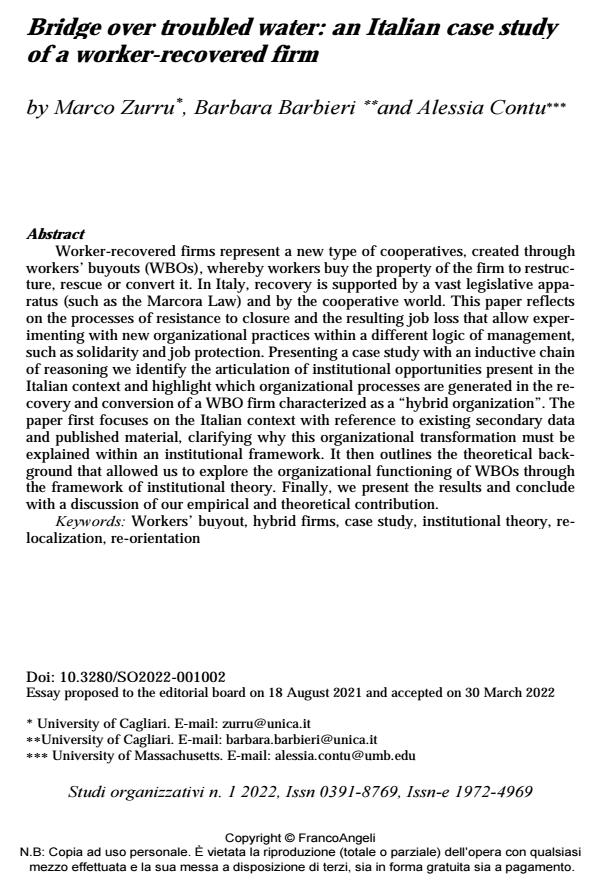Bridge over troubled water: an Italian case study of a worker-recovered firm
Titolo Rivista STUDI ORGANIZZATIVI
Autori/Curatori Marco Zurru, Barbara Barbieri, Alessia Contu
Anno di pubblicazione 2022 Fascicolo 2022/1
Lingua Inglese Numero pagine 29 P. 21-49 Dimensione file 230 KB
DOI 10.3280/SO2022-001002
Il DOI è il codice a barre della proprietà intellettuale: per saperne di più
clicca qui
Qui sotto puoi vedere in anteprima la prima pagina di questo articolo.
Se questo articolo ti interessa, lo puoi acquistare (e scaricare in formato pdf) seguendo le facili indicazioni per acquistare il download credit. Acquista Download Credits per scaricare questo Articolo in formato PDF

FrancoAngeli è membro della Publishers International Linking Association, Inc (PILA), associazione indipendente e non profit per facilitare (attraverso i servizi tecnologici implementati da CrossRef.org) l’accesso degli studiosi ai contenuti digitali nelle pubblicazioni professionali e scientifiche.
Worker-recovered firms represent a new type of cooperatives, created through workers’ buyouts (WBOs), whereby workers buy the property of the firm to re-structure, rescue or convert it. In Italy, recovery is supported by a vast legislative apparatus (such as the Marcora Law) and by the cooperative world. This paper reflects on the processes of resistance to closure and the resulting job loss that al-low experimenting with new organizational practices within a different logic of management, such as solidarity and job protection. Presenting a case study with an inductive chain of reasoning we identify the articulation of institutional opportunities present in the Italian context and highlight which organizational processes are generated in the recovery and conversion of a WBO firm characterized as a "hybrid organization". The paper first focuses on the Italian context with reference to existing secondary data and published material, clarifying why this organizational transformation must be explained within an institutional framework. It then outlines the theoretical background that allowed us to explore the organizational functioning of WBOs through the framework of institutional theory. Finally, we present the results and conclude with a discussion of our empirical and theoretical contribution.
Le imprese recuperate dai lavoratori rappresentano una nuova forma di cooperative create attraverso il workers’ buyout (WBO), che si riferisce alla ristrutturazione, salvataggio o conversione di un’azienda da parte dei lavoratori che ne comprano la proprietà. In Italia, il recupero trova supporto in un ampio apparato legislativo (come la Legge Marcora) e nel mondo delle cooperative. Questo articolo parte dai processi di resistenza e opposizione alla chiusura di aziende e alle conseguenti perdite di lavoro, che danno vita a sperimentazioni di nuove pratiche organizzative inquadrate in una logica gestionale basata su solidarietà e protezione dei posti di lavoro. Con metodo induttivo, partendo da un caso studio italiano - l’impresa Isolex, azienda chimica con sede in Sardegna - delineiamo le opportunità istituzionali presenti in questo contesto nazionale e i processi organizzativi generati dal recupero e riconversione di un’impresa recuperata caratterizzata da un’organizzazione ‘ibrida’. Nell’articolo presentiamo il contesto italiano, partendo da dati secondari e letteratura sul tema, spiegando perché l’analisi della trasfor-mazione organizzativa necessiti un approccio istituzionale. Introduciamo quindi i risultati della nostra ricerca empirica e il contributo teorico.
Parole chiave:Impresa recuperata, organizzazioni ibride; studio di caso; teo-ria istituzionale; ri-localizzazione, ri-orientamento
Marco Zurru, Barbara Barbieri, Alessia Contu, Bridge over troubled water: an Italian case study of a worker-recovered firm in "STUDI ORGANIZZATIVI " 1/2022, pp 21-49, DOI: 10.3280/SO2022-001002